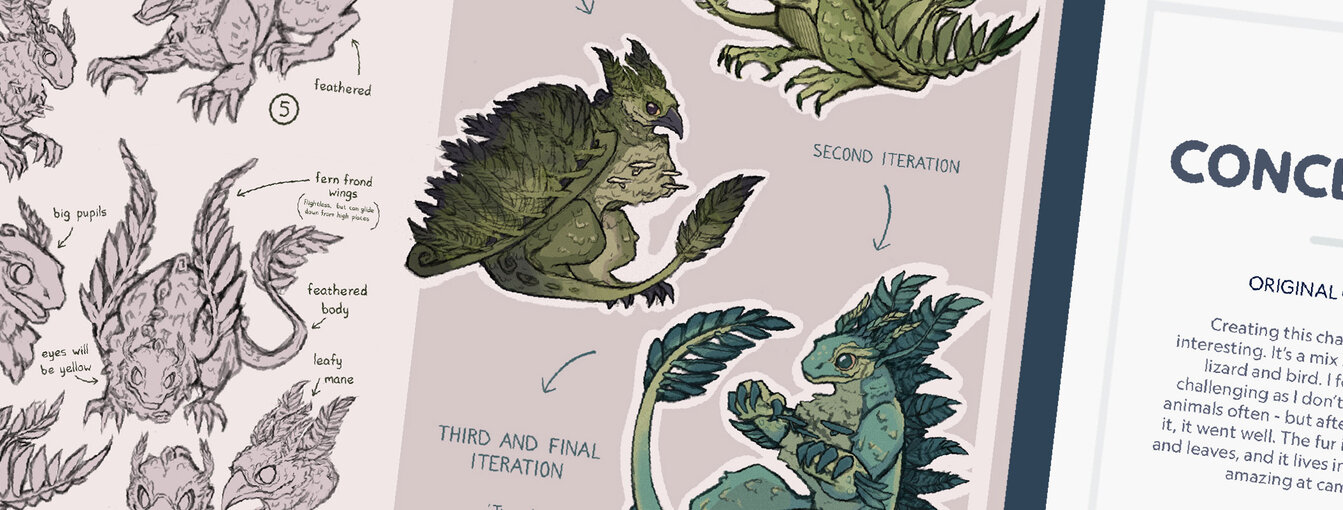What is a portfolio?
They say to not judge a book by its cover - but does that ring true for artists too?
A portfolio is a way for you to ‘show, not tell’ what you’re capable of. Use it as your evidence of your passion, creativity and dedication to the craft. We recommend creating a digital portfolio to ensure that your original pieces do not risk being lost or damaged during your application. To give us the best idea of what you can do, you should include at least 12 pieces of work, with varying techniques, styles and formats.
But don’t let the pressure get to you! It’s not an art competition, we just want to see how passionate you are, because we’ll teach you the rest once you’re here.
Our Portfolio Tips
Our programme leaders have hundreds of years of experience between them, so keep these tips in mind when making your portfolio.
1. Determine your audience and purpose
2. Show variety
3. Highlight your strengths
4. Keep it concise
Course Specific Portfolio Requirements
Below are details for specific courses, like what work they expect to see or what format you should present your portfolio in.
Your portfolio is a selection of work that shows your skills and talents. It introduces you and your ideas, and shows us you have the creativity and imagination to be a student at Media Design School. There are no strict rules about what you should include in your portfolio. As a guide, it should include a range of 12 - 20 pieces of your best works that represent who you are as a creative person. We recommend including a range of media and styles. It is not imperative you include digitally rendered artworks.
| File format | PDF, Website URL or JPGs |
| Things you could include: |
|
| File format | PDF, Website URL or JPGs |
| Things you could include: |
|
| File format | PDF, Website URL or JPGs |
| Things you could include: |
|
| File format | PDF, Website URL or JPGs |
| Things you could include: |
|
Your portfolio is a selection of work that shows your skills and talents. It introduces you and your ideas, and shows us you have the creativity and imagination to be a student at Media Design School. There are no strict rules about what you should include in your portfolio. As a guide, it should include a range of 12 - 20 pieces of your best works that represent who you are as a creative person. We recommend including a range of media and styles. It is not imperative you include digitally rendered artworks.
| File format | PDF, Website URL or JPGs |
| Things you could include: |
|
| File format | PDF, Website URL or JPGs |
| Things you could include: |
|
How to prepare your portfolio
If you are applying for Graduate Studies you'll already have a body of work and a portfolio. When applying, we'll expect your portfolio to be to a professional standard, clearly indicate your areas of interest, and who you are as an artist. We would also like to see your show-reel if applicable, for areas of interest such as visual effects and motion graphics.
| File format | PDF, Website URL or JPGs |
| Things you could include: |
|
| File format | PDF, Website URL or JPGs |
| Things you could include: |
|
Portfolio Requirements - Evidence of Creative Abilities
Applicants are required to submit creative portfolios in addition to their previous academic history.
The creative portfolio is a showcase of your previous design and creative works. It is very much like a visual resume. The aim of the portfolio is to showcase the breadth and depth of your skills, knowledge and experiences in design. It should highlight key projects you have worked on illustrating both the thinking and design processes and the final outcome.
Portfolios must show an applicant’s creative potential and ability. All applicants must submit a portfolio of representative samples even if they have not had formal training in art and design. A good portfolio may contain a variety of work; sketches, drawings, painting mixed media, multimedia, photography, design creations etc.
| File format | PDF, Website URL or JPGs |
| Things you could include: |
|
| File format | PDF, Website URL or JPGs |
| Things you could include: |
|
Not all courses at Media Design School require a portfolio with your application. For applications to the Foundation level courses, Game Programming, Artificial Intelligence, Information Technology, Creative Advertising and Digital Transformation courses, click the links below to find out more on the course page.
Game Programming - Bachelor of Software Engineering
Artificial Intelligence - Bachelor of Software Engineering
